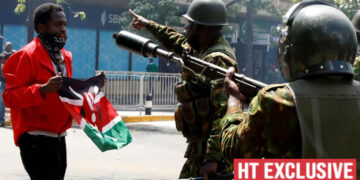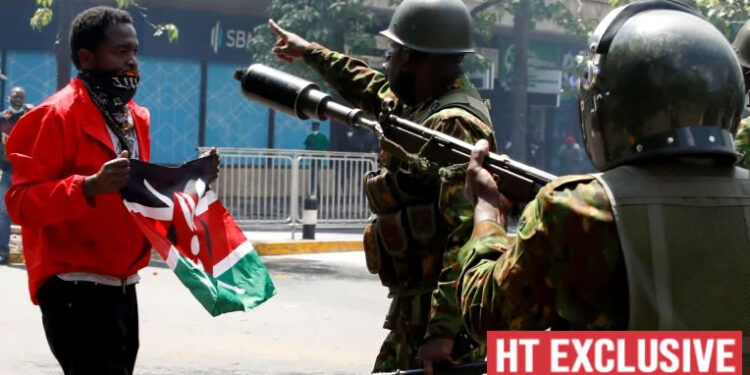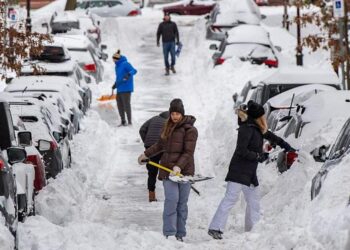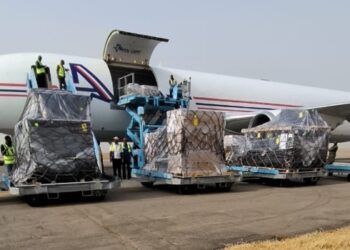By John Ikani
For years, people across East Africa looked to Kenya as a place where freedom was guaranteed. Unlike Uganda and Tanzania, Kenya had laws that protected people’s right to protest and speak out. You could stand in the street and criticise leaders without worrying you’d be arrested or worse. But that promise is slipping away fast.
This June, protests against President William Ruto’s government turned deadly. Police opened fire on crowds angry over new taxes and rising living costs. At least ten people were killed. The government tried to block TV and radio stations from showing what happened. Still, videos of police shooting at protesters spread everywhere.
Kenya’s biggest newspaper, The Standard, didn’t hold back. Its front page called the government a “Rogue Regime.” The paper said the people had filled the streets to honour those who died in protests last year. But instead of hearing them out, the government sent in armoured trucks, rolled out razor wire, and crushed them with force.
While families buried their loved ones, Interior Minister Kipchumba Murkomen insisted police had shown “remarkable restraint.” He claimed the protesters were criminals trying to overthrow the government. But he offered no proof. Instead, hundreds were injured, and more than 300 people were locked up without charges.
The Law Society of Kenya was outraged. Its leaders called the police actions “unnecessary aggression” and said killing unarmed citizens had no place in any democracy. Their anger only grew after the death of Albert Ojwang, a young teacher and blogger. Police arrested him because he was accused of insulting a top officer. Days later, he was dead in custody. An autopsy showed he had been beaten badly.
His killing sparked another protest in Nairobi. Police moved in again. A street vendor who wasn’t even part of the march was shot at close range. He’s still fighting for his life in a hospital bed.
These scenes have forced many Kenyans to ask hard questions. Was Kenya ever really so different from its neighbors? Or did people just want to believe it was?
For years, Tanzanian activists praised Kenya’s bold spirit. One of them, Tundu Lissu, often said his country should learn from Kenya’s example. In 2017, Lissu survived after being shot 16 times. Even that didn’t stop him from speaking out. But now, he sits in a Tanzanian prison, accused of treason. If convicted, he could be executed.
Lissu’s party is barred from running in Tanzania’s upcoming election because it refused to sign the rules that would silence it. Uganda’s opposition faces similar threats. Kizza Besigye, President Museveni’s top rival, has been jailed since November. The government claims he tried to stage a coup. No evidence has been shown.
Kenya’s leaders like to point out that the country still has an independent court system. Elections happen regularly. Power can change hands. But Martha Karua, a former justice minister and respected human rights lawyer, sees a darker picture. She says, “East Africa is facing not just an economic crisis but a deep crisis of democracy.” Her words ring louder now, as more activists vanish or are forced into hiding.
Besigye found out the hard way that Kenya is no longer safe. Last November, he came to Nairobi to launch a book. Days later, he disappeared. He turned up in Uganda, standing before a military judge. The Ugandan government claimed he was in Kenya to buy weapons. Kenya’s officials first denied any role. Later, they admitted “there were issues” but didn’t explain. Sources close to both governments say Kenya quietly agreed to hand him over.
Two months after that, Tanzanian activist Maria Sarungi Tsehai was pulled off a Nairobi street by four men. They shoved her into a car, choked her, and tried to unlock her phone. Hours later, they let her go. No one claimed responsibility. But Maria is certain the men worked for security forces.
Years ago, such actions would have caused outrage in Kenya’s government. This time, President Ruto did something unexpected. He apologised, not to the victims, but to Tanzania’s leaders. “If we have wronged you in any way, forgive us,” he said.
Macharia Munene, a Kenyan expert in foreign relations, believes Ruto’s apology was a way to calm Tanzania’s worries. He says Tanzanian officials fear Kenyan activists will stir up trouble during their elections. Ruto, in turn, is under pressure to keep those activists in line.
Tanzania’s President Samia Suluhu Hassan has also warned that foreign activists are not welcome. “They have already created chaos in their own country,” she said.
Meanwhile, back in Kenya, more than 80 people have been abducted over the past year. They were taken by men in unmarked cars, never identified. Some came back alive. Others didn’t. The African Union hasn’t stepped in. The United Nations issues statements but takes no action. The United States, busy with its own problems, looks away.
Yet despite all this, Kenya’s activists refuse to give up. Boniface Mwangi has been beaten, threatened, and jailed many times. But he still believes the only answer is to stand together. “If these people are united in oppressing their citizens, then we must be united in fighting to remove them from power,” he said.
Today, Kenya doesn’t look like the safe haven it once claimed to be. Its neighbours never pretended to respect democracy. Kenya did. Now, that story is falling apart. And the people paying the price are the ones who still dare to speak the truth.



































